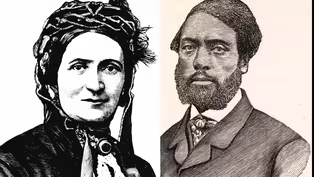
Sissieretta Jones
Clip: Season 4 Episode 10 | 6m 57sVideo has Closed Captions
In-depth second look at iconic soprano Sissieretta Jones.
An in-depth profile of one of the most famous African American sopranos that most people have never heard of. Sissieretta Jones was revered by audiences around the world at the turn of the 20th century. While she was the first African American woman to headline on a main stage at Carnegie Hall, she was shut out of performing at other major venues in the U.S. because of the color of her skin.
Problems playing video? | Closed Captioning Feedback
Problems playing video? | Closed Captioning Feedback
Rhode Island PBS Weekly is a local public television program presented by Ocean State Media

Sissieretta Jones
Clip: Season 4 Episode 10 | 6m 57sVideo has Closed Captions
An in-depth profile of one of the most famous African American sopranos that most people have never heard of. Sissieretta Jones was revered by audiences around the world at the turn of the 20th century. While she was the first African American woman to headline on a main stage at Carnegie Hall, she was shut out of performing at other major venues in the U.S. because of the color of her skin.
Problems playing video? | Closed Captioning Feedback
How to Watch Rhode Island PBS Weekly
Rhode Island PBS Weekly is available to stream on pbs.org and the free PBS App, available on iPhone, Apple TV, Android TV, Android smartphones, Amazon Fire TV, Amazon Fire Tablet, Roku, Samsung Smart TV, and Vizio.
Providing Support for PBS.org
Learn Moreabout PBS online sponsorshipShe was known simply as Sissieretta Jones and was revered by audiences and dignitaries around the world at the turn of the 19th century.
But Jones was largely shut out of performing at major venues around the United States because of the color of her skin.
Still, she was ultimately the highest paid African-American vocalist during a 28 year career in which she had to reinvent herself to survive and keep singing.
Tonight we take another look at her storied career with Rhode Island artist April Brown as our guide.
- [April] Sissieretta Jones was born in Portsmouth, Virginia in 1869, and this empty lot is where her family moved when she was seven years old, is 20 Congdon Street.
- What brought her family to Providence?
- Well, better economic opportunities.
There wasn't a lot of opportunities for the former enslaved, and her father, Jeremiah Joiner, he became the pastor of Pond Street Baptist Church, and her mother, Henrietta Beal, she sang in the church choir.
We think that Sissieretta Jones got her singing voice from her mom.
Let's go to Pond Street Baptist Church so you can see where her father pastored.
- Where exactly is the church?
- You see that highway over there?
That was where Pond Street Baptist Church was located.
- Wow.
Is that where Sissieretta Jones began her career?
- You know, she began singing in her father's church when she was 14, and then she went on to study music at Providence Academy of Music and later in Boston.
- Describe for me what her voice sounded like.
- So no one knows what her voice sounded like.
There are no recordings, but there are newspaper reviews that rave about her voice.
- What songs was she most famous for?
- She was mostly known for "Old Folks at Home" which we know is "Swanee River" and "Ave Maria".
- [Michelle] Did she mostly sing inside of the church?
- [April] No, actually she toured in Europe and sang before royalty.
They gave her 17 medals that she would proudly display on her gown whenever she performed.
- How did Europeans respond then to having this American singer abroad?
- European audiences refer to her as the Black Patti, named after Adelina Patti, the famed Italian soprano of the time.
She didn't care for that nickname too much.
She preferred to be called Madame Jones.
- It sounds like Sissieretta Jones was very loved in Europe.
How did people respond to her here in the United States?
- She faced severe racism.
She did perform for four US presidents, Harrison, McKinley, Cleveland, and Theodore Roosevelt.
But all but Roosevelt, she had to enter the White House through the back door.
- Was she barred from performing in other locations?
- Yes, in 1896, the Metropolitan Opera considered her for a lead role, but they denied her the role because of her race.
- [Michelle] That must have been devastating.
- [April] I suspect it was crushing for her.
- [Michelle] What other options did she have then?
- [April] Not many.
She ended up headlining a troupe called the Black Patto Troubadours.
- [Michelle] What kind of acts did they perform?
- [April] It was a minstrel show.
They had to perform in blackface, but there were singers, dancers, jugglers, acrobatic acts.
But the one thing that she was able to get out of it was she ended each show singing "Ave Maria".
She made $20,000 a year at that time, which made her the highest paid African-American entertainer at that moment.
- [Michelle] And how long was she doing that for?
- [April] About 20 years.
- [Michelle] Wow.
A long time.
When did she stop performing?
- Sissieretta Jones retired in 1915 because her mom became ill. And so she returned back here to Providence to take care of her.
And right around here, 7 Wheaton Street is the house where they lived in.
But the street and the house no longer exists.
- Once she retired, how was Sissieretta Jones able to support herself?
- Well she was the highest earning African-American performer at her time, and so she was able to live off of her earnings, but then times got hard and she had to sell three of the four houses that she owned, and then she had to sell some of her medals.
In 1933, Sissieretta Jones died penniless and she was buried here in Grace Church Cemetery in an unmarked grave.
And then, 85 years later, the Providence community raised money for her to have this beautiful headstone.
She was beautiful, wasn't she?
- She was a beautiful woman.
As you reflect on the life of Sissieretta Jones, what do you think her legacy is?
- I think without Sissieretta Jones, there would be no Marion Anderson, there would be no Jesse Norman, there would be no Kathleen Battle.
I believe that African-American opera singers owe their career to Madame Sissieretta Jones.
She once said "we come through the furnaces of affliction and persecution and become as gold, tried in a fire.
As the crushed rose admits the sweetest perfume, so the negro, bruised and beaten, sings the sweetest songs".
That's her true legacy.
(birds chirping)
Video has Closed Captions
Clip: S4 Ep10 | 11m 1s | Noise pollution is more than just a nuisance. It’s also a public health issue. (11m 1s)
Video has Closed Captions
Clip: S4 Ep10 | 9m 51s | Slaves William and Ellen Craft’s dangerous journey to freedom in the mid-1800s. (9m 51s)
Providing Support for PBS.org
Learn Moreabout PBS online sponsorship
- News and Public Affairs

Top journalists deliver compelling original analysis of the hour's headlines.

- News and Public Affairs

FRONTLINE is investigative journalism that questions, explains and changes our world.












Support for PBS provided by:
Rhode Island PBS Weekly is a local public television program presented by Ocean State Media

